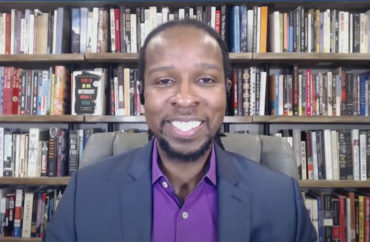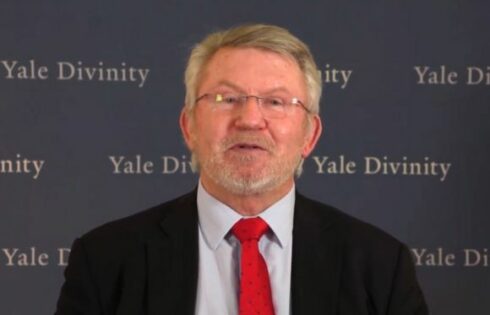
In a Q&A session with the nation’s largest teachers’ union on Wednesday, Boston University Professor Ibram Kendi likened opposition to “antiracist” teaching in schools to the backlash schools faced after the Supreme Court desegregated public education in the 1950s.
“The only thing that I can compare this recent wave of what is happening in our school districts, what’s happening in our school districts, what’s happening in our communities, is it really reminds me of the reaction and the response to the Brown v. Board of Education decision when there was widespread fear in certain schools and certain communities that, quote, those desegregated schools with those black children were going to be harmful to white children,” Kendi said. “And it’s similarly being cast, or framed, as if teaching about history, teaching about racism, even teaching about slavery is going to somehow harm white children.”
“And then, there’s the monstrous lie that this effort to teach kids about racism is an effort to teach white children that they are inherently evil and racist. No teacher – at least no antiracist teacher – would be teaching that,” Kendi said.
The question about Critical Race Theory was asked by moderator Fedrick Ingram, who said, “as far as I know, and what the AFT has researched, that’s a theory taught in law school, not a curriculum taught in high school.”
But in a speech prior to Kendi’s speech, AFT President Randi Weingarten said education has a vital role to play in forming an “antiracist” society.
“We are committed to helping educators understand how to engage with diverse student populations to focus on promoting racial literacy, to enable educators to advocate for racial inclusivity, to change collective practices and policies that impact education outcomes in public schools. That’s our work,” she said.
She decried Republican legislators who are “bullying” teachers, trying to prevent them “from teaching kids honest history.”
“Maybe they’re just trying to raise the temperature on race relations because of the next election, but whatever it is, it’s not good right now,” Weingarten said.
Kendi’s speech was also prefaced by Ingram discussing how AFT was partnering with the professor to create a special version of his most recent book, in order to “get copies of this book into the hands of middle and high school students across the country to inspire them to have courageous conversations about racism.”
“Also, how they can become antiracist themselves and help create antiracist schools and communities,” Ingram said.
As he does in his book, How to Be an Antiracist, Kendi frequently compared “metastatic racism” to “metastatic cancer,” suggesting society would not get better until it found an adequate treatment.
“It is anathema, it is heresy to for us to say, ‘you know what, the way we will get rid of cancer in someone’s body is to not talk about it,’” said Kendi, who is himself a cancer survivor. “And let’s not walk into that room and diagnose that person, or me, with stage four metastatic colon cancer because it’s going to devastate me, it’s going to hurt me.”
“It allowed me the ability to get treatment, to become better, to grow healthy.”
“That is one of the best metaphors I have ever heard,” responded Ingram.
Later, Kendi returned to the cancer theme.
“If we just act like there’s no such thing as racist ideas, if we just act like there are not kids of color who are saying ‘I want to be white,’ or if we just act like there are not white kids who believe, or who are taught to believe, that it’s great that they are white – if we just act like this isn’t happening, it’s equivalent to acting like people don’t have cancer,” he said.
Kendi criticized state legislators who have been passing laws attempting to limit racial indoctrination in schools.
“It really pains me because these lies that somehow we’re seeking to teach that all American institutions are evil, that all America is fundamentally and permanently racist, these are not positions that I’m articulating, that even critical race theorists are articulating, but they have been contrived and then sort of packaged as critical race theory, and then critical race theory has been expanded to really any conversation about race and racism, and to me it’s just been sad.”
“To me, we live in a dangerously racist society,” he said. “There are racist ideas that are swirling around that are teaching darker skinned kids that there is something wrong with them because of the color of their skin. There are ideas swirling around that are teaching white kids that there is something right about them because of the color of their skin.”
“I think it’s important for people to actively teach white children that you’re special because you work hard. You’re special because you’re kind. You’re not special because you’re white. Because there are ideas circulating that are teaching that.”
He did not give any specific examples of subjects taught to children of color that teach them there is something wrong with them because of the color of their skin, or subjects that teach white students they are better because they are white.
Kendi also offered a shout-out to teachers who are “completely dismissing and rejecting and not being bothered by the political whirlwinds that are circling over our heads,” and advocated for teachers to take a more activist role in teaching antiracism.
“It is our job as teachers and educators to explain” why racial disparities exist, he said, adding, “The prudent thing for teachers to do to say it is not that certain people have less because they are less, the cause of the disparities that you see are the result of racism, are the result of bad rules, are the result of history. And we’re trying to change this.”
He noted in Germany, the Holocaust is being taught to kindergarteners to make sure it never happens again. Consequently, he said slavery should be taught as early as possible, even if descriptions of violence were not included.
“The earlier we teach, the better.”
He also urged teachers to find ways around laws limiting what can be taught to students. As an example, Kendi cited teachers in the South who were told to teach history using textbooks that said the Civil War was based on states’ rights and not slavery and that the KKK saved the South from the corruption of the Reconstruction era.
“These historical lies were baked into the curriculums and some of the social studies texts. Do you think these teachers taught that to black students? No, many of them figured out ingenious ways to teach black students that there was nothing wrong with them.”
“The courageous teachers were willing to defy the odds,” he said.
MORE: Six months later, no apparent progress on Ibram Kendi’s racial data tracker
IMAGE: AFT/YouTube
Like The College Fix on Facebook / Follow us on Twitter






Please join the conversation about our stories on Facebook, Twitter, Instagram, Reddit, MeWe, Rumble, Gab, Minds and Gettr.